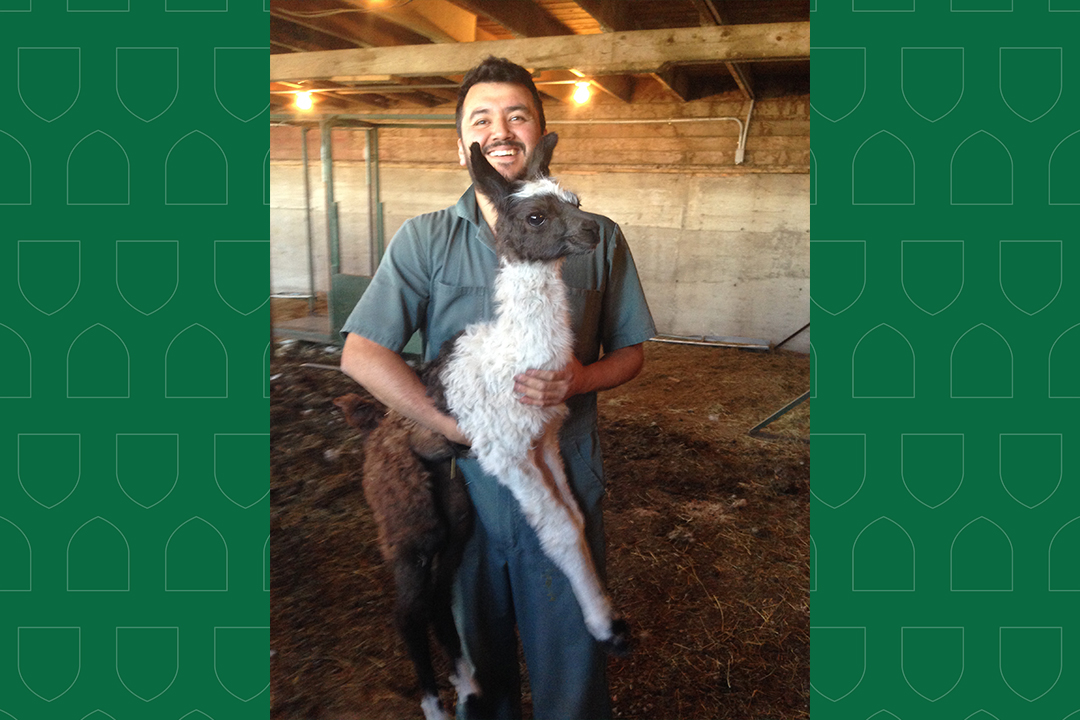
Reproduction scientist receives USask Governor General’s Gold Medal
Dr. Rodrigo Carrasco’s investigation of a protein’s role in triggering ovulation for certain mammals earned him one of the University of Saskatchewan’s (USask) two Governor General’s Gold Medals for 2020-21.
By Jessica ColbyCarrasco, a PhD student with Dr. Gregg Adams at the Western College of Veterinary Medicine’s (WCVM) Department of Veterinary Biomedical Sciences, was “very surprised” to learn that he had received one of the highly competitive awards.
“I think it is a great acknowledgment of the hard work and the ambitious ideas we have been carrying in our lab for years and the endless support from my wife and kids,” says Carrasco.
Each year, the university’s College of Graduate and Postdoctoral Studies (CGPS) presents Governor General’s Gold Medals to the top two PhD students for overall academic performance in all components of their graduate programs including thesis, coursework, awards, publications and presentations related to their field of research.
Dr. Ian McPhail (PhD), who graduated in clinical psychology at the 2020 USask Fall Convocation, is the second USask recipient of the Governor General’s Gold Medal for this academic year.
Carrasco’s PhD work focused on the action of a protein called nerve growth factor (NGF) that’s present in the semen of several mammals including llamas, camels and alpacas –– members of the camelid family. Carrasco is investigating the ways in which NGF may trigger ovulation in these species.
“The existence of an ovulation-inducing factor in semen should make us revisit the influence of seminal components on female reproduction of all species,” says Carrasco.
During his investigations, Carrasco and others in Adams’ reproduction lab discovered that the NGF present in mammals’ semen is important to start ovulation in camelid species. He adds that the effect of NGF may be carried in the hypothalamus –– an integral part of the brain.
Carrasco says that his research is important because the findings of the study could potentially lead to new reproductive control methods in both livestock and humans by using drugs to control the function of tanycytes (a group of cells in the hypothalamus).
Carrasco’s interest in understanding the neuroendocrine control of hormonal secretion was piqued during his Doctor of Veterinary Medicine (DVM) degree at the Universidad Austral de Chile in Valdivia, Chile.
“While in veterinary school, I became fascinated with basic science courses, particularly veterinary physiology, which introduced me to the world of physiological regulation and the involvement of hormones,” says Carrasco.
One of Carrasco’s courses was taught by Dr. Marcelo Ratto, a former WCVM graduate student, who saw potential in his student. Through this connection, Carrasco met Adams, who invited Carrasco to join his USask lab in Saskatchewan. Carrasco first completed a Master of Science (MSc) degree before embarking on his PhD program. His master’s thesis focused on NGF in bovine ovaries and the llama hypothalamus.
“He’s [Carrasco] been a stellar student in a lot of ways,” says Adams, who serves as Carrasco’s supervisor and nominated him for the USask graduate award. “One of the things that I felt was remarkable about Rodrigo is he has an innate curiosity and he’s not afraid of following that.”
Adams describes Carrasco as “very modest and low key” about his research work. He adds that Carrasco has succeeded in many aspects of his life and research during his time at the WCVM.
“He volunteers to help others when they need it and participates in the graduate student enterprise and presents at local and international conferences,” says Adams. “He’s done really well.”
Carrasco, who grew up on a farm in southern Chile, has always known that animals would be his career’s focus.
“I decided to attend veterinary school given my natural affinity to farm animal work and the good prospects in the veterinary profession,” says Carrasco. “It sounds cliché, but as I grew up on a dairy farm, the only thing I could visualize myself doing was working with cattle.”
Jessica Colby of Montmartre, Sask., is a fourth-year student in the University of Regina’s School of Journalism. She is working as a research communications intern at the Western College of Veterinary Medicine (WCVM) for summer 2021.
